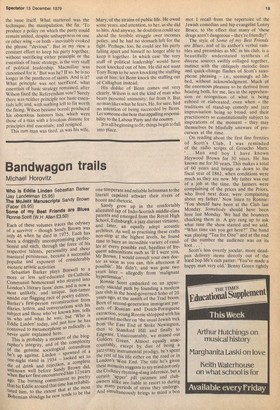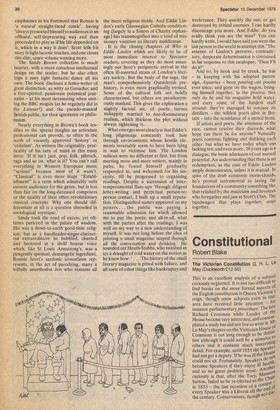Bandwagon trails
Michael Horovitz
Who is Eddie Linden Sebastian Barker (Jay Landesman £5.95) The McJazz Manuscripts Sandy Brown (Faber £6.95) Some of my Best Friends are Blues Ronnie Scott (W.H. Allen £3.50)
Each of these volumes traces the odyssey of a survivor — though Sandy Brown was only 46 when he died in 1975. Each has been a doggedly uncompromising perfectionist and each, through the force of his respective talents, personality and sheer maniacal persistence, became a successful populist and exponent of considerably esoteric artistic activities. Sebastian Barker plays Boswell to a More or less self-educated ex-Catholic Communist homosexual who strayed into London's literary lions' dens, and is now a Most unlikely, and unique, lion-tamer amidst our flagging race of poetry editors. Barker's first-person reconstruction from diaries, letters, and conversations with his subject and those who've known him, tells us who and what he was; but 'Who is Eddie Linden' today, and just how he has contrived to metamorphose so radically, is never quite explained here. This is probably a measure of the biographer's integrity, and of the complexity of the genuine sociological conundrum he's up against. Linden — spawned of a one-night stand in 1934 — looked set to die of drink and rejection, a complete unknown well before Sandy Brown did, When Barker first encountered him 12 years ago. The burning commitment to poetry that bit Eddie around that time has rehabilitated him, to the extent that at the most Bohemian shindigs he now tends to be the one temperate and reliable helmsman to the literati capsized athwart their rivers of booze and rhetoric.
Sandy grew up in the comfortably alienated lap of Indo-Scottish middle-class parents and emerged from the Royal High School, Edinburgh, a jazz clarinet virtuoso, and later, an equally adept acoustic architect. As well as practising these crafts non-stop at the highest levels, he found time to burn an incredible variety of candles at every possible end, heedless of frequent admonitions such as 'If I were you, Mr Brown, I would consult your own doctor as soon as you can, this afternoon if possible'. He didn't, and was gone two years later — allegedly from 'malignant hypertension'.
Ronnie Scott embarked on an appar ently suicidal path by founding a modern jazz club in the hood-governed Soho of 20 years ago, at the zenith of the Trad boom. Born of second-generation immigrant parents of Russian and Dutch-Portuguese extraction, young Ronnie shlepped with his remarried mother on 'the usual Jewish trek from the East End of Stoke Newin then to Stamford Hill and finally to we missed Edgware. Unaccountably, gton. Golders Green.' Almost equally unac countabl d out Y, except by. dint of being a jazz-crazy instrumental prodigy, he's spent the rest of his Life either on the road or in London's West End. The title he's given these memoirs suggests to my mind not only the Cockney rhyming-slang inference, but a 'upper' pill jazzmen and clubowners alike are liable to resort to during he many n y Periods of stress they undergo. t certain And simultaneously brings to mind a bon mot I recall from the repertoire of the Jewish comedian and hip evangelist Lenny Bruce, to the effect that many of 'these drugs aren't dangerous — they're friendly The style of Some of my Best Friends are Blues, and of its author's verbal rambles and preambles as MC in his club, is a beautifully understated synthesis of diverse sources swiftly collaged together, instinct with the obliquely melodic lines and quick-change flashes of Scott's saxophone phrasing — i.e., seemingly ad libbed, without acknowledgment. Much of the enormous pleasure to be derived from hearing both, for me, lies in the apprehension or recognition of what is being echoed or elaborated, even when — the traditions of stand-up comedy and jazz improvisation being so broad, and their practitioners so constitutionally subject to inspirations of the moment — they may themselves be blissfully unaware of precursors at the time.
On reading about the first fine frenzies of Scott's Club, I was reminded of the radio scripts of Grouch() Marx: . .. Man and boy I have known Heywood Brown for 30 years. He has known me for 30 years. This makes a total of 60 years and brings us down to the fiscal year of 1861, when conditions were much as they are now. My father was out of a job at the time, the farmers were complaining of the prices and the Prices, who lived next door, were complaining about my father.' Now listen to Ronnie: 'You should have been at the Club last Monday. Somebody should have been here last Monday. We had the bouncers chucking them in. A guy rang up to ask what time the show started and we said, "What time can you get here?" The band was playing "Tea for One" and at the end of the number the audience was on its foot . . '
Scott's less overtly jocular, more deadpan delivery stems directly out of the hard bop life's rich patter: 'You've made a happy man very old.' Benny Green rightly emphasises in his Foreword that Ronnie is 'a natural straight-faced comic', having 'always presented himself to audiences in an offhand, self-deprecating way and then proceeded to play as if his life depended on it, which in a way it does'. Scott tells his story in light laconic touches, and one closes this slim, spare volume wanting more.
The Sandy Brown collection is much heavier, with a more conscious intellectual design on the reader, but he also often trips a zany light fantastic dance all his own. The book discloses a letter-writer of great distinction, as witty as Groucho; and a free-spirited, passionate polemical journalist — at his most devastating when smiting the BBC moguls (as he regularly did in the Listener!) and the pseudo-musical British public, for their ignorance or philistinism.
Nearly everything in Brown's book testifies to the special insights an articulate professional can provide, so often in the teeth of vacantly approved 'history' or 'criticism'. As witness the originality, practicality of his turn of mind in this essay intro: 'If it isn't jazz, pop, folk, pibroch, raga and so on, what is it? You can't call everything in Western European music "serious" because most of it wasn't. "Classical" is even more inapt. "Establishment" is a term which admirably suits current audiences for the genre, but is less than fair on the long-deceased composers or the quality of their often revolutionary musical concepts. Why one should differentiate at all is a question shrouded in sociological mystique.'
Sandy took the road of excess, yet ofttimes parleyed in the palace of wisdom. His was a down-to-earth good-time religion; but as a bandleader-singer-clarinettist extraordina ire he bubbled, chanted and hectored in a shrill hoarse voice which, like St Louis Armstrong's, was a pungently spiritual, demangelic ingredient. Ronnie Scott's sardonic iconoclasm represents, in the act of parodying, many a wilfully unorthodox Jew who remains all the more religious inside. And Eddie Linden's early Glaswegian Catholic conditioning (largely in a Sisters of Charity orphanage) has transmogrified into a kind of missionary vocation as literary middleman.
It is the closing chapters of Who is Eddie Linden which are likely to be of most immediate interest to Spectator readers, covering as they do most amusingly our hero's peripatetic arrival in the often ill-assorted strata of London's literary society. But the body of the saga, the man's comprehensively Outsiderish prehistory, is even more graphically evoked. Some of the cultural folk are boldly characterised, but others are pseudonymously masked. This gives the exploration a slightly factoid air, of poetic licence unhappily married to neo-documentary realism, which thickens the plot without always tightening it.
What emerges most clearly is that Eddie's long pilgrimage constantly took him through environments whose hostile elements invariably seem to have been lying in wait to victimise him. The London milieux were no different at first, but from meeting more and more writers, mainly in pubs, he found himself gradually responded to, and welcomed for his sincerity, till he progressed to organising readings. Despite a succession of intertemperamental flare-ups 'through diligent letter-writing and perpetual persdn-toperson contact, I built up a small reputation. Distinguished names appeared on my posters . . . the public was paying a reasonable admission fee which allowed me to pay the poets; and all-in-all, what with the parties after the readings, I was well on my way to a new understanding of myself. It was not long before the idea of printing a small magazine seeped through all the conversation and drinking.' He sounded out Heath-Stubbs, who swashed as Icy a draught of cold water on the notion as he knew how: . . . The history of the small literary magazine is pitted with failure, and all sorts of other things like bankruptcy and irrelevance. They quickly die out, or get destroyed by critical enemies. I can hardly discourage you more. And Eddie, do you really think you are the man? You can hardly write, I would have said you were the last person in the world to attempt this.' The essence of Linden's perverse, contradictory, desperate determination is contained in his response to this catalogue: 'Then I'll dolt!' And so, by hook and by crook, he has — in keeping with his adopted patron sign, Aquarius — been pouring out poems ever since; and gone on the wagon, bringing himself together, in the process. Not only do he and his magazine hold water, and carry some of the hardest stuff around: they've managed to conjure its distillers — the wildest poets alive in Britain — into the semblance of a united front.
If artists and poets, the antennae of the race, cannot resolve their discords, what hope can there be for anyone? Naturally poets continue fighting and disliking each other, but what we have today which was lacking ten, and even more, 20 years ago is a dialogue, the basic admission of our mutual potential. An understanding that there is no redemption, as the case of Eddie Linden amply demonstrates, unless it is mutual. In spite of the drab economic storm-clouds, he's proved instrumental in laying the foundations of a community something like, that relished by the musicians and devotees who foregather and jam at Scott's Club. The bandwagon that plays together, stays together.



































 Previous page
Previous page